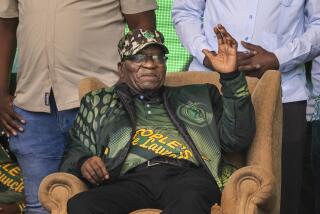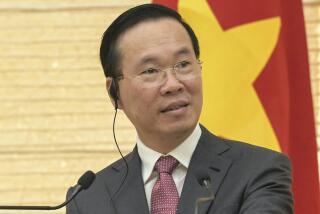S. African Deputy President Is Fired
- Share via
JOHANNESBURG, South Africa — President Thabo Mbeki sacked his popular deputy over corruption allegations Tuesday, deflecting concerns that the South African government was slow to act in the face of scandal.
The firing of Deputy President Jacob Zuma, who had been widely seen as Mbeki’s heir apparent, raised questions about who will succeed the president in 2009 and upset some of the ruling party’s supporters in the trade unions.
Zuma came under intense pressure to resign after his financial advisor, Schabir Shaik, was sentenced last week to 15 years in prison for paying the deputy president nearly $190,000 to aid Shaik’s business and for soliciting a bribe for Zuma from a French arms company. Zuma has not yet faced charges in the case.
“I have come to the conclusion,” Mbeki said, “that the circumstances dictate that in the interest of the honorable deputy president, the government, our young democratic system and our country, it would be best to release the honorable Jacob Zuma from his responsibilities as deputy president of the republic.”
Mbeki has led a campaign for good governance in Africa, and analysts said it would have been difficult for him to go to next month’s meeting of the Group of 8 leading industrial nations without having resolved the Zuma question. African leaders have called on the G-8 leaders, including President Bush, to increase aid to their continent and have promised in exchange to battle corruption.
Zuma, who had resisted resigning and spent the past days trying to drum up support, continued to protest his innocence Tuesday, saying he had been tried in the media.
“I believe he [Mbeki] has taken this decision not because he believes I am guilty of any crime but because of considerations relating to the constraints in which government operates,” Zuma said after the decision.
Mbeki’s action against his powerful deputy surprised some analysts. The move was widely seen as an important step to repair the damage to the government and ruling African National Congress party over their perceived willingness to tolerate corruption.
The firing comes after 21 members of Parliament, 18 of them from the ANC, appeared recently in court facing charges of fraud related to allegedly diverting parliamentary travel allowances for private use. Five other ruling party lawmakers pleaded guilty to similar charges in March. After some initial hesitation, the ANC recently announced that those found guilty would lose their parliamentary seats.
“I think the ANC, in the eyes of the world, had been lagging in the world on corruption,” said political analyst Raymond Louw, editor of the political journal Southern Africa Report. “We weren’t living up to the kind of Western standard, but I think this rather strong move by Mbeki will resuscitate South Africa as a country that is prepared to act against corruption and prepared to act properly.
“If Thabo Mbeki had gone to the G-8 meeting without having taken some action against Zuma and corruption in the country, I don’t think he would have got anywhere,” Louw added.
On Saturday, finance ministers from the G-8 agreed to forgive about $40 billion of debt for 18 of the world’s poorest nations.
Zuma is widely seen as a charming and powerful figure with a popular touch and strong support in the left wing of the ANC party and in trade unions and among rank-and-file members. It was his credentials as a liberation fighter, however, that made the decision to fire him painful for the ruling party.
Zwelinzima Vavi, general secretary of the Congress of South African Trade Unions, said he was devastated by the move.
“This is a very, very trying moment for the movement as a whole,” Vavi said.
Former President Nelson Mandela backed Mbeki’s decision, adding that he was sad to see someone who had made a major contribution to South Africa’s liberation struggle come to such a point in his life and career.
Mbeki won rare praise from opposition parties. Democratic Alliance leader Tony Leon said it would be remembered as a landmark decision.
Paul Graham, executive director of the Institute for Democracy in South Africa, said he was surprised by Mbeki’s decisive approach, given the intense political pressure over the issue and Zuma’s popularity in the ANC.
“I think it sends quite an important message about our commitment to our constitution and about our commitment to actually ensuring that people at the highest level of office are committed to clean government,” he said.
More to Read
Sign up for Essential California
The most important California stories and recommendations in your inbox every morning.
You may occasionally receive promotional content from the Los Angeles Times.












